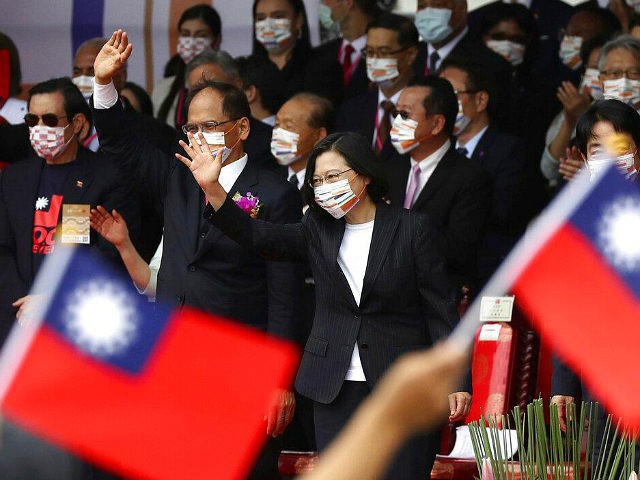Gen. Vincent Wen-fan Chen, deputy director of Taiwan’s National Security Bureau, warned in the current issue of the Indo-Pacific Defense Forum magazine that Communist China is moving forward on a long-established plan to solve its Taiwanese “problem” by “terminating Taiwan as it is.”
Chen said Taiwan is standing on the front lines against Chinese influence operations across the Pacific region.
Building on remarks he made in an October 2019 speech, Chen said Taiwan occupies a “unique” position similar to Ukraine and the Baltic states hovering on the edge of Russia’s sphere of influence, but Taiwan is geographically alone in facing “the most powerful party-state in history” in a struggle between “liberal democracy and totalitarian dictatorship.”
“From the perspective of cognitive warfighting, defined as the capacity to weaponize knowledge, Taiwan has a unique vulnerability because Mandarin Chinese is the common language for both China and Taiwan,” he noted.
“With the unrestrained resources in centralized policy at its discretion, Beijing could easily monopolize or overwhelm the Chinese-speaking audience to achieve the PRC’s goal of subliminal cognition manipulation,” he said, noting that Chinese journalists are literally required to pass tests to prove they understand and can regurgitate Communist ideology.
In addition to this information warfare and the worldwide “digital Leninism” engineered by dictator Xi Jinping, Chen said the Chinese Communist Party (CCP) is determined to “appropriate modern global means of production” to achieve its political goals and spread its ideology. He named China’s Belt and Road Initiative (BRI), a massive international infrastructure program also known as One Belt, One Road, as a primary means of using economic power to spread the CCP’s influence.
“Through its investment in think tanks, social organizations, and elite of other countries using Confucius Institutes, the CCP broadened its foreign influence to cultivate a pro-China public opinion in the world,” Chen wrote. The U.S. Department of Education just released a troubling report about the extent of China’s influence over American higher education through financial “gifts” and the Confucius Institutes program.
Taiwan is clearly an obstacle to China’s strategy, and Chen claimed Xi has established a “deadline of 2049 to solve the Taiwan ‘problem’ vis-a-vis annexation.” Chen said this annexation plan is not purely envisioned as military conquest but rather “military coercion” combined with the diplomatic isolation of Taiwan, infiltration and subversion, disinformation campaigns, cyber warfare, and interfering in Taiwanese politics by cultivating a pro-China opposition.
“All of these activities are incorporated into the PRC’s propaganda framework intended to shape the Taiwan mindset, preferably to the extent of annexing Taiwan without bloodshed,” he said.
Chen’s conception of “military coercion” essentially positions China’s aggressive military drills, intimidating air and sea operations, and constant threats of invasion as a form of psychological warfare. He said Xi worked with Russia, Iran, and North Korea to make trouble in the Middle East and Northeast Asia that would distract the United States, making the Taiwanese feel encircled by China and its allies on all sides, with America too overextended to be much help if China does decide to invade.
Chen alleged that two Chinese scholars told U.S. intelligence officials in 2019 that Xi has developed a plan for “forceful unification” that could be implemented by 2022 if he judges the United States is sufficiently distracted and bogged down to leave Taiwan exposed to an invasion.
The rest of his extensive analysis suggested Xi might not have to pull the trigger on such a costly military operation if he can keep the plausible threat of invasion hovering over the heads of the Taiwanese while the rest of his influence, disinformation, and cyberwarfare campaigns play out. Chen said the Chinese People’s Liberation Army (PLA) has been working on such a coordinated “cognitive warfare” strategy since 2018.
Chen said Taiwan could weather this cognitive assault with a little help from its friends, especially the United States. He credited such Trump administration moves as the Taiwan Travel Act of 2018, the Taiwan Assurance Act of 2019, and the Taipei Act of 2020 with firmly establishing Taiwan as a “partner of vital interest to the U.S.” and its other allies. This not only sent a message to Beijing — it sent an equally important message to the Taiwanese people, countering China’s efforts to make them feel lonely and vulnerable.
Chen said Taiwan is eager to return the favor by developing “cognitive interoperability” with the rest of the free world, contributing its experience in defense against cognitive warfare and digital Leninism.
“From the cognitive perspective with U.S. support, it is worth considering that Taiwan and like-minded countries form an interregional alliance of cybersecurity,” he advised, suggesting that Taiwan could become part of an early warning system for the entire world when China launches cyberwar attacks and propaganda blitzes.

COMMENTS
Please let us know if you're having issues with commenting.